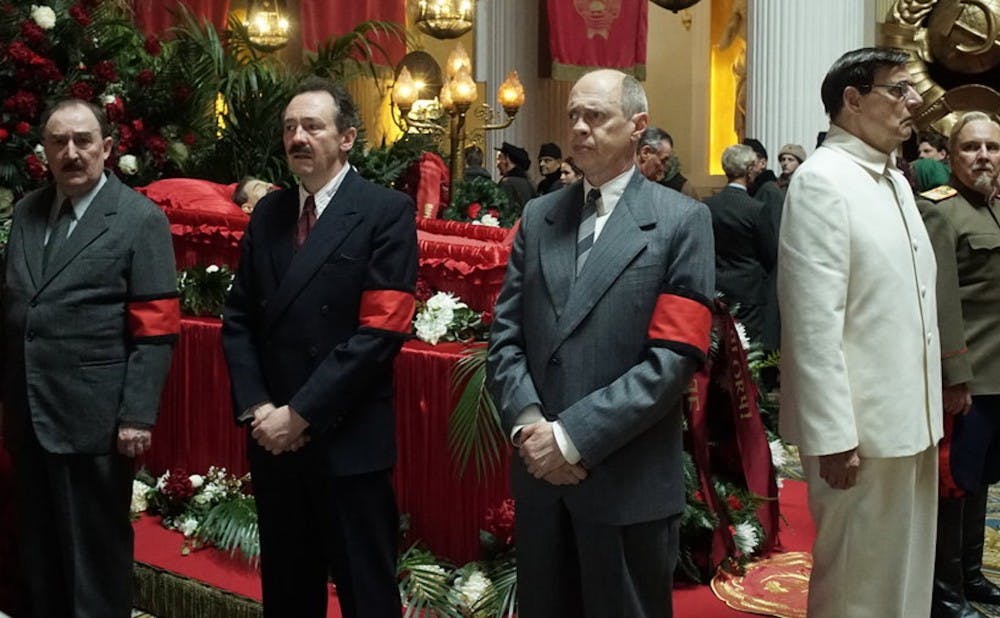When you play the game of succession, you win or you die.
So goes the motto for the Soviet Central Committee following the departure of everyone’s favorite dictator in the hilariously twisted “The Death of Stalin.” Known for his work on “In the Loop” and “Veep,” director Armando Iannucci has long been an important voice for political satire, both in his native United Kingdom and the United States. This time around, the Scottish filmmaker dives much further into the darkness with a film that approaches its most diabolical elements in a disturbingly light-hearted manner.
Only a cast as talented as the troupe assembled in “The Death of Stalin” could have made the film’s devious subjects sources of comedy. The two frontrunners to replace the deceased Secretary Stalin — Simon Russell Beale’s Lavrentiy Beria and Steve Buscemi’s Nikita Khrushchev — treat their political rivalry like a petty squabble. From racing to give condolences to Stalin’s grieving daughter to freeing the imprisoned wife of one less-than-appreciative Committee member, Beale and Buscemi’s frantic political maneuvers induce scores of laughter. Equally comical are minor characters Georgy Zhukov and Vasily Stalin, played by Jason Isaacs and Rupert Friend, respectively. In one memorable scene, the latter drunkenly berates the “cratering fannies” calling themselves the Soviet hockey team; only later is it implied that Vasily’s players are merely replacements he gathered to cover up the death of the actual team in a plane crash three years earlier.
The dichotomy between the comedic absurdity of “The Death of Stalin” and the actual horror of the era, however, proves most troubling upon realizing that stories like Vasily’s truly happened. Iannucci smartly forces these two sides of the film to remain in equilibrium. Throughout scenes of farcical comedy, the director often provides wandering shots of the tortures and murders of the comrades unfortunate enough to have seen or heard too much. The technique works best in a scene in which Deputy Malenkov’s immature concerns over optics prolong a debate about halting executions in the Gulags. The human cost of Malenkov’s ineptitude is subsequently emphasized as the film cuts to Soviet officers shooting at a line of prisoners until receiving the much-delayed ceasefire command from the Central Committee.
Although the Russian Ministry of Culture banned the film from playing in the country’s theaters, “The Death of Stalin” clearly has its sights aimed at the leadership of the U.K. and the U.S. The director even tips his hand through the brilliant decision to cast primarily British and American actors, each of whom stick to their normal voices instead of donning a Russian accent. So while the incongruence of picturing Nikita Khrushchev as Steve Buscemi provides a fantastic joke in and of itself, Buscemi’s portrayal could just as easily represent any other cunning American politician.
For American audiences, the blurring tones of comedy and severity hark back to the past election cycle, in which then-candidate Trump’s behavior provided a treasure trove’s worth of material for Saturday Night Live writers (rather than a warning to American voters). As Salena Zito explained in The Atlantic in 2016, the masking effect of comedy caused the “press [to take] him literally, but not seriously.” A similar dangerous tendency is seen throughout the movie; without a careful eye, viewers could easily miss the subtle hints towards Beria’s predatory behavior or Khrushchev’s complicity in countless murders. Such is the immense power of the comedy prevalent in the political sphere.
Perhaps the most direct attack on our current president comes toward the end of the movie, after some of the dust has settled and the rotating door of the Central Committee has been temporarily slammed shut. Alluding to the incompetence of Deputy Malenkov, Lazar Kaganovich asks Khrushchev, “Can you ever trust a weak man?” Judging by the trainwreck that has been the Trump presidency so far — especially in the wake of the most recent firings within his administration — Kaganovich’s rhetorical query could just as easily apply to the present moment.
While Iannucci’s latest film hardly plays as a serious piece, the most poignant epiphany occurs the moment viewers realize a comedy movie about 1953 Moscow provides a direct parallel to 2018 Washington. And when Nikita Khrushchev is the protagonist of the best movie so far to embody Trump’s America, it’s time for the country to reconsider what differentiates the leader of the free world from its tyrannical enemies.
Get The Chronicle straight to your inbox
Signup for our weekly newsletter. Cancel at any time.

